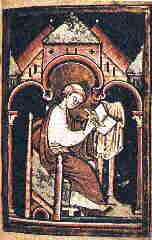Readings:
Job 38:1, 12-21
Psalm 23
2 Corinthians 6:1-10
Luke 5:12-16Preface of a Saint (2)
[Common of a Pastor]
[Common of a Monastic or Professed Religious]
[For the Ministry II]
[Of the Reign of Christ]
PRAYER (traditional language)
Merciful God, who didst call Cuthbert from following the flock to be a shepherd of thy people: Mercifully grant that we also may go without fear to dangerous and remote places, to seek the indifferent and the lost; through Jesus Christ our Lord, who liveth and reigneth with thee and the Holy Ghost, one God, for ever and ever. Amen.
PRAYER (contemporary language)
Merciful God, who called Cuthbert from following the
flock to be a shepherd of your people: Mercifully grant
that we also may go without fear to dangerous and remote
places, to seek the indifferent and the lost; through Jesus
Christ our Lord, who lives and reigns with you and the
Holy Spirit, one God, for ever and ever. Amen.
Lessons revised at General Convention 2024.
Return to Lectionary Home Page
Webmaster: Charles Wohlers
Last updated: 18 January 2025
CUTHBERT OF LINDISFARNE,
BISHOP AND MISSIONARY (20 MAR 687)
 Cuthbert
was born in Northumbria in northern England about 625. One night, while
tending a herd of sheep, he saw lights in the sky which he interpreted
as a soul being escorted heavenward by a band of angels. Later, he learned
that Aidan of Lindisfarne (31 August 651) had died that night, and he
resolved to enter the monastic life. He was a monk at Melrose Abbey from
651 to 664, and when the Abbot, Eata, became abbot and bishop at Lindisfarne,
Cuthbert accompanied him and was Prior there until 676. Although he had
been brought up in the Celtic customs, he accepted the decrees of the
Synod of Whitby in 663, which committed the English Church to following
instead the Roman customs that had been introduced into Canterbury by
Augustine, and so he helped to minimize contention over the decision.
Although his real preference was for the solitary life of a hermit, he
recognized a duty to minister to the needs of the people about him. Year
after year he made long journeys, on horseback and on foot, to Durham
and throughout Northumbria, and in the regions of Berwick and Galloway,
preaching to the scattered population in remote and sparsely settled areas,
instructing them in the faith and encouraging them in the practice of
it, urging them in times of sickness not to rely on charms or amulets,
but to pray to God and put their trust in His mercy and love. Like Francis
of Assisi, he had a remarkable rapport with animals, both wild and domestic.
Cuthbert
was born in Northumbria in northern England about 625. One night, while
tending a herd of sheep, he saw lights in the sky which he interpreted
as a soul being escorted heavenward by a band of angels. Later, he learned
that Aidan of Lindisfarne (31 August 651) had died that night, and he
resolved to enter the monastic life. He was a monk at Melrose Abbey from
651 to 664, and when the Abbot, Eata, became abbot and bishop at Lindisfarne,
Cuthbert accompanied him and was Prior there until 676. Although he had
been brought up in the Celtic customs, he accepted the decrees of the
Synod of Whitby in 663, which committed the English Church to following
instead the Roman customs that had been introduced into Canterbury by
Augustine, and so he helped to minimize contention over the decision.
Although his real preference was for the solitary life of a hermit, he
recognized a duty to minister to the needs of the people about him. Year
after year he made long journeys, on horseback and on foot, to Durham
and throughout Northumbria, and in the regions of Berwick and Galloway,
preaching to the scattered population in remote and sparsely settled areas,
instructing them in the faith and encouraging them in the practice of
it, urging them in times of sickness not to rely on charms or amulets,
but to pray to God and put their trust in His mercy and love. Like Francis
of Assisi, he had a remarkable rapport with animals, both wild and domestic.
 Theodore, the Archbishop of Canterbury, made Cuthbert Bishop of Hexham,
but he was a solitary by nature, and promptly exchanged bishoprics with
Eata so as to remain at Lindisfarne. After two years, he retired to the
neighboring island of Farne as a hermit, and died there the following
year.
Theodore, the Archbishop of Canterbury, made Cuthbert Bishop of Hexham,
but he was a solitary by nature, and promptly exchanged bishoprics with
Eata so as to remain at Lindisfarne. After two years, he retired to the
neighboring island of Farne as a hermit, and died there the following
year.
by James Kiefer